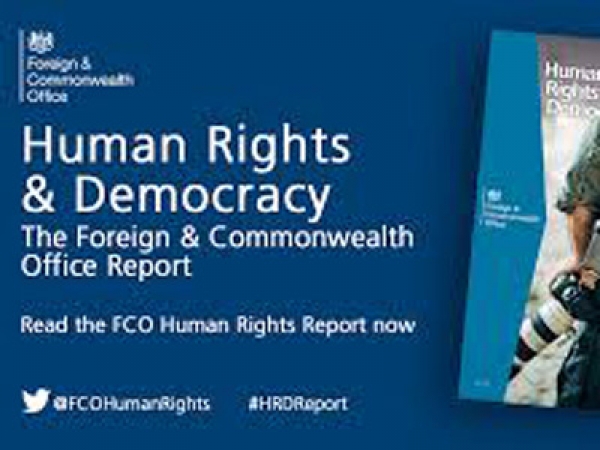A latest human rights reported said that overall human rights situation in Sri Lanka in 2019 deteriorated with increased inter-communal tensions, violence against minority groups and intimidation of human rights defenders.
This was mentioned in the ‘Human Rights and Democracy Report-2019’ which was published by the UK Foreign and Commonwealth Office (FCO) on July 16.
The report said while Sri Lanka reaffirmed its commitment to post-conflict reconciliation and accountability through its co-sponsorship of UN Human Rights Council Resolution 40/1, delivery on this remained too slow.
“Controversial senior appointments called into question Sri Lanka’s commitment to human rights and reconciliation. Towards the end of 2019, there were reports of increased surveillance and intimidation of civil society groups and human rights defenders,” it said.
It further said, “At the UN Human Rights Council (HRC) in March, Sri Lanka co-sponsored Resolution 40/1, which gave Sri Lanka a further 2 years in which to implement in full the outstanding measures identified by the HRC in Resolution 30/1. The UK welcomed this and the progress made to date, including the establishment of an Office of Missing Persons and the ratification of the Convention on Enforced Disappearances. However, more progress was needed on constitutional reform, the establishment of transitional justice mechanisms, and the replacement of the Prevention of Terrorism Act.
On Easter Sunday in April, 6 bomb attacks targeted churches and hotels across Sri Lanka. The attacks marked the largest number of deaths from terrorism in a single day in Sri Lanka’s long history of conflict. Those who suffered losses during the Easter Sunday attacks were paid compensation. There were reports that, given the scale of the attacks, a large number of people were arrested for alleged involvement in extremism. Although most were released on bail, a number remained on remand. Sri Lanka has a history of using open-ended periods of detention, largely against minority groups.
The aftermath of the attacks saw several incidents of violence against the Muslim community, including riots in which one man was killed and several mosques, homes and businesses were damaged, as well as further reports of intimidation and discrimination against Muslims, refugees, and asylum seekers. In May, the then President, Maithripala Sirisena, ordered the pardon of extremist monk Ven Galagodaaththe Gnanasara, the de facto leader of the extreme Buddhist Nationalist movement Bodu Bala Sena (Buddhist Power Force), despite him being found in contempt of court. UK ministers raised the issue of minority rights with their Sri Lankan counterparts. The UK continued to support inter-religious dialogue and reconciliation through the Conflict, Stability and Security Fund (CSSF) programme, including working with local organisations to encourage dialogue and the monitoring of incidents of violence and intimidation against members of religious minorities.
In June, the then President repeated his intention to end the country’s moratorium on the death penalty, and signed the warrants for 4 executions specifically for death row inmates who the state believed had been engaged in continued drug trafficking from within prison. On 5 July the Supreme Court issued an interim order halting executions until 30 October, following a number of petitions challenging President Sirisena’s decision. The interim order was extended to 10 December. The UK urged Sri Lanka to maintain the moratorium in an FCO statement in June, at the HRC, and through direct engagement.
In August, Sri Lanka’s cabinet approved a proposal to amend the Muslim Marriage and Divorce Act. The proposal included amendments to the legal age for Muslim marriage, increasing it to 18. But there was no further legislative progress on the issue of child marriage in 2019.
In August, President Sirisena appointed Major General Shavendra Silva as the new army commander. The UK and other international partners expressed concern about the appointment given the allegations of serious human rights violations made against the division which Major General Silve had commanded at the end of the civil war. This appointment called into question Sri Lanka’s commitments made to the HRC on justice and accountability. In response to the appointment, the UN Department of Peace Operations announced in September that it would suspend future deployments of Sri Lankan peacekeepers, except where suspension would expose UN operations to serious operational risk.
In October, Minister for South Asia and Human Rights, Lord (Tariq) Ahmad of Wimbledon, visited Sri Lanka. He underlined the importance of freedom of religion or belief, and reconciliation and accountability in his engagement with ministers and the then President. Lord Ahmad met faith leaders and civil society groups working on reconciliation and inter-communal relations.
In November’s presidential elections, former Defence Secretary, Gotabaya Rajapaksa, won 52% of the vote on an 83% turnout. An EU observer mission concluded in its interim report that the 2019 presidential elections were free, fair, and largely trouble free. However, unregulated campaign spending, abuse of state resources, and media bias affected the level playing field. The media and information environment in the lead-up to the elections was characterised by misinformation, partisan media, and online hate-speech. Some journalists were subjected to searches, interrogation, and intimidation after the elections.
In November, the new government reassigned key police officers who had been investigating alleged human rights violations and abuses, and related crimes. It announced its intention to establish a Special Presidential Commission to investigate the activities of the police. Towards the end of 2019, there were multiple reports of increased surveillance and intimidation of activists, particularly those working on legal and transitional justice issues.”










